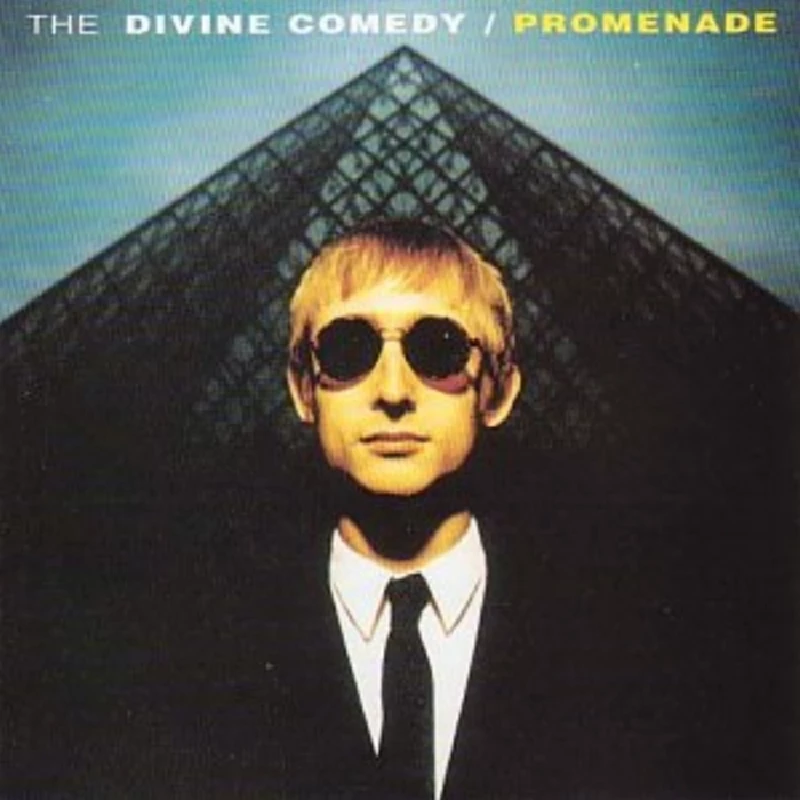Miscellaneous - Promenade
by Benjamin Howarth
published: 23 / 7 / 2007

Label:
Select Label
Format: N/A
intro
In the latest in our 'Re : View' series, in which our writers re-examine albums from the past, Hen Howarth looks at the Divine Comedy's still under-rated second album, 'Promenade', which was originally released in 1994
Known to most, if he is known at all, as a minor celeb who had some minor hits on the crest of the Britpop wave and the back of breakfast DJ Chris Evans, Neil Hannon is the Divine Comedy. This vicar’s son is a quite unlikely pop star, but he has many hit records to his name, and provided the theme music to classic comedy 'Father Ted', and vocal talents to the recent revival of 'Doctor Who'. It is actually unfair to dismiss his ‘hit’ albums as being Britpop B-listers. ‘Generation Sex’, ‘Becoming More Like Alfie’ and ‘Something For The Weekend’ are all sublime, and fully deserved to chart. Hannon combined thoughtfulness, wise cracks and a cracking string section to make some great songs that graced the charts. Indeed, there were even better moments hidden on the albums ‘Casanova’ and ‘Fin De Siecle‘, not least the beautiful ‘Commuter Love’, the infectious ‘A Woman of the World’ and the majestic ‘Sundown’. Hannon has continued to produce impressive albums into this decade, and he made my favourite album of last year, ‘Victory for the Comic Muse’ His notable ‘cult’ following is, however, rooted in his efforts prior to becoming almost famous. Although I’m sure there are Divine Comedy fans who prefer other albums, there is little dispute that his second album, ‘Promenade’ is the rallying point for the truly devoted. Released in 1994 to good reviews but limited sales (though it was a huge success in France), this album remains original, and I think I can fairly describe it as his masterpiece. The centrepiece of the album, and the very best demonstration of Neil Hannon’s ability to mix sublime with ridiculous, is ‘Don’t Look Down’. Opening with a bombastic string based intro, the song slips into a soppy acoustic ballad about a couple riding on a Ferris wheel. Then, in a blink, it has become a two way conversation with God about the justification for atheism. Given that Hannon’s father is a prominent bishop in the Northern Ireland Anglican church, this is a daring but poignant rant. It is also exhilarating listening. There are, however, a string of equally majestic songs. ‘When The Lights Go Out All Over Europe’ is a dramatic and irresistible paean to vintage European cinema. ‘The Summerhouse’ is a beautiful nostalgia piece about childhood summers by the sea. ‘The Booklovers’ is truly unlike any other song I know - essentially a long list of quips about great authors, set to music. Why this works, I can’t explain. Saving the best till last, the final track is the heart stopping ‘Tonight We Fly’. The whole album had been building up to this song, and it remains the show stopper at every Divine Comedy concert to this day. It sounds like how you felt when England won the Ashes, pure joy put to music. Why is this album so different from most ‘indie’ albums? There are a number of reasons. Hannon has often been accused of being superficial. In fact, he is unashamed to show the world his true self - a well read upper-middle class romantic. No pseudo Trotskyism or yob moronism here. Hannon likes nice food, nice wine and classily made pop music. You sense that he knows what is important in life, and thus doesn’t need to take anything that seriously. There is something old fashioned about Hannon, and although he is happy to affect many things, that trait seems natural. Another difference is Hannon’s mood. He has said that he was unhappy when he made the album, and the subsequent move towards more ‘commercial’ music came when he was more comfortable. Yet, though there is always a tinge of sadness in every track, this is a broadly celebratory album. Be it wine and spirits, seafood, fine literature, classic cinema, a Ferris wheel, a roasting fire, a warm bath or a long holiday, life for the reunited couple who star in these songs is always rather pleasant. Indeed, the final words on the album are "If heaven doesn’t exist, what will we have missed, this life is the best we’ll ever have". Having said that, the Divine Comedy are easily compared to other (more miserable) bands. The ghosts of Morrissey, Bowie and Scott Walker surface often. Kraftwerk are also clearly an influence, and the similarity between the string parts and the contemporary composer Michael Nyman’s film scores is so great that Hannon sent him a copy of the CD with a note hoping he wouldn’t sue. (He didn’t, and the pair ended up collaborating on a live show some years later). ‘Promenade’ works because each song complements the others, because the lyrics are either clever, funny or emotional and because there are no weak moments. Like the best work of the Smiths, it feels like it could have been made in any decade. It is remarkable that such an impressive album is now so hard to find. The only way to purchase it is through I-Tunes. Even an attempt to track down a second hand copy on CD will leave the wallet feeling decidedly empty, though it is well worth trying, I say. Many bands from the Britpop era have suffered similar forgetful fates. But, this album is too good for that, and deserves to be remembered and revisited.
Track Listing:-
Picture Gallery:-


most viewed articles
current edition
Carl Ewens - David Bowie 1964 to 1982 On Track: Every Album, Every SongArmory Show - Interview with Richard Jobson
Colin Blunstone - Thalia Hall, Chicago, 16/7/2025
Visor Fest - Valencia, Spain, 26/9/2025...27/9/2025
Bathers - Photoscapes 1
John McKay - Interview
Billie Eilish - O2 Arena, London, 10/7/2025
Sir Tim Rice - Interview
Loft - Interview
Robert Forster - Interview
previous editions
Heavenly - P.U.N.K. Girl EPManic Street Preachers - (Gig of a Lifetime) Millennium Stadium, Cardiff, December 1999
Beautiful South - Ten Songs That Made Me Love...
Oasis - Oasis, Earl's Court, London, 1995
Pixies - Ten Songs That Made Me Love...
Trudie Myerscough-Harris - Interview
Prolapse - Interview
Doris Brendel - Interview
Peter Perrett - In Dreams Begin Responsibilities Interview Part One
Simon Heavisides - Destiny Stopped Screaming: The Life and Times of Adrian Borland
most viewed reviews
current edition
Amy Macdonald - Is This What You've Been Waiting For?Sick Man of Europe - The Sick Man of Europe
Phew, Erika Kobayashi,, Dieter Moebius - Radium Girls
Lucy Spraggan - Other Sides of the Moon
Bush - I Beat Loneliness
Davey Woodward - Mumbo in the Jumbo
Alice Cooper - The Revenge of Alice Cooper
Suzanne Vega - Flying With Angels
Blueboy - 2
Cynthia Erivo - I Forgive You
Pennyblackmusic Regular Contributors
Adrian Janes
Amanda J. Window
Andrew Twambley
Anthony Dhanendran
Benjamin Howarth
Cila Warncke
Daniel Cressey
Darren Aston
Dastardly
Dave Goodwin
Denzil Watson
Dominic B. Simpson
Eoghan Lyng
Fiona Hutchings
Harry Sherriff
Helen Tipping
Jamie Rowland
John Clarkson
Julie Cruickshank
Kimberly Bright
Lisa Torem
Maarten Schiethart